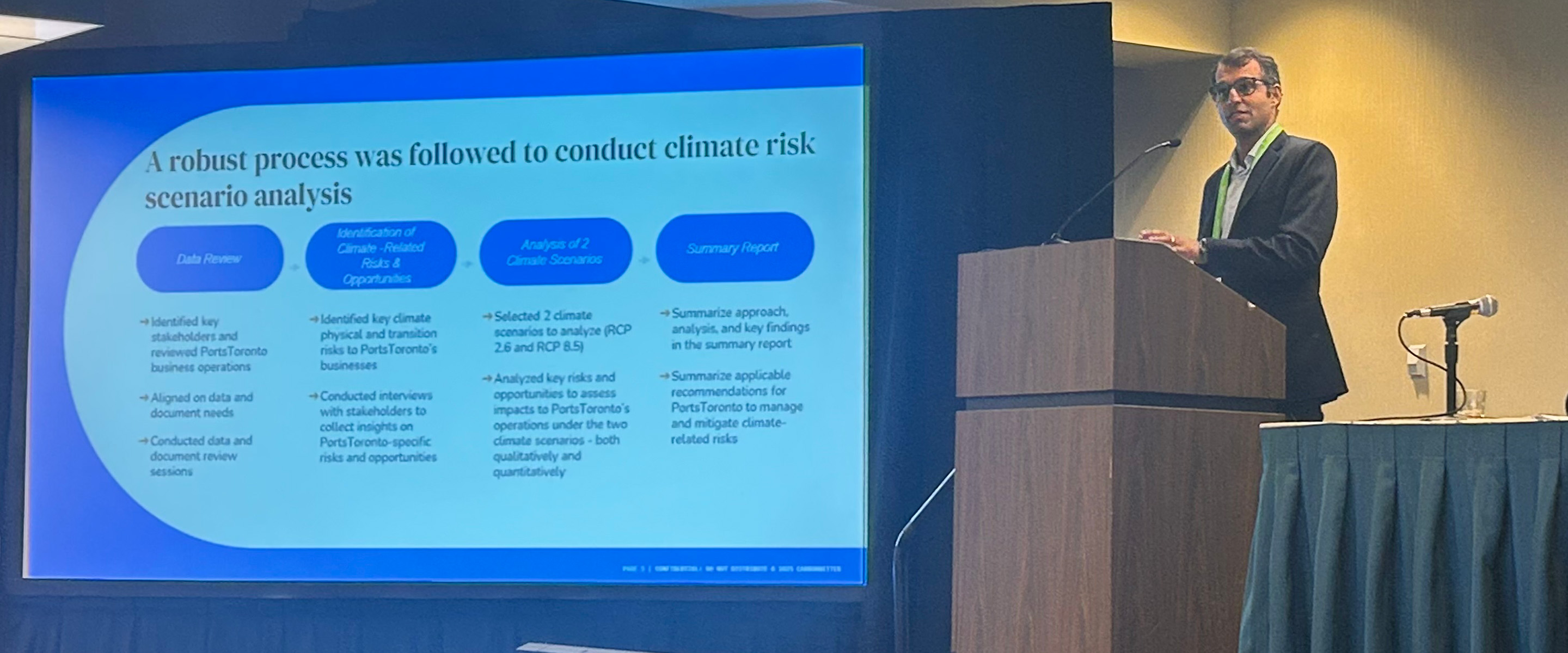4 Takeaways From Greentech 2025

GreenTech 2025 focused on practical solutions for building sustainable maritime operations.
Last week, I attended GreenTech 2025, hosted by Green Marine in New Orleans, Louisiana. Now in its 18th year, the annual conference brought together leaders from across the maritime sector—including ports, shipping companies, logistics providers, terminal operators, and academic institutions—to discuss strategies, insights, and innovations driving sustainable progress in maritime transportation. A huge thanks to Véronique Trudeau and Manon Lanthier from Green Marine for planning and executing the event! I had the opportunity to connect with maritime leaders from across North America and present on the topic, “Utilizing Climate Scenario Risk Analysis to Enable Long-Term Planning and Fortify the Future,” with Juhi Matta.
Below are my key takeaways from the amazing event:
Strong Industry Commitment to Sustainability and Environmental Justice
The maritime sector is increasingly prioritizing sustainability, especially when it comes to integrating environmental justice into community outreach efforts. There were discussions at Greentech 2025 about how ports and maritime operators are aligning their operations with broader societal goals, such as equitable access to clean air and water. This commitment is driven by growing stakeholder expectations, regulatory pressures, and a genuine recognition of the industry’s role in benefiting nearby communities.
Noise Reduction and Decarbonization as Key Priorities
Noise reduction and decarbonization were recurring topics. Noise pollution from port operations affects both ecosystems and nearby communities. Decarbonization, meanwhile, remains a complex challenge due to the energy-intensive nature of maritime activities. Technologies such as shore power, low-carbon fuels, and electrification of port equipment are viable pathways, though scalability remains a hurdle.
“Discussions at Greentech 2025 focused on practical strategies such as using climate scenario analysis to guide infrastructure planning, utilizing energy efficiency and increased electrification to reduce emissions, addressing noise impacts on communities and ecosystems, and embedding environmental justice into long-term sustainability goals.”
Pankaj Tanwar, Managing Director, Climate Services

🌍 Carbon markets can feel overwhelming—fragmented data, limited transparency, and conflicting advice make it hard to know where to start. In this webinar, our experts give a clear, practical introduction to the VCM.
Mitigating Climate Risk Through Scenario Analysis
Climate scenario analysis, encompassing both physical and transition risks, was a key theme during the conference. Several sessions, including ours, highlighted how ports are using climate scenario analysis to identify and evaluate both near- and long-term risks. By examining business-as-usual and Paris Agreement-aligned pathways, ports can assess a range of risks—from sea-level rise and extreme precipitation to shifts in carbon policy and investor expectations. This approach helps them identify vulnerabilities across their operations to inform long-term business strategies, enhancing resilience and driving long-term value creation.
Carbon Offsets Can Be a Pragmatic Option to Act as a Bridge to Full Decarbonization
A candid acknowledgment at Greentech 2025 was that full decarbonization is not yet feasible for many maritime operations due to technological and economic constraints. Carbon offsets were recognized as a practical tool to address residual emissions. High-quality carbon offsets, verified through rigorous standards, can fund projects like reforestation or renewable energy development. However, offsets must complement, not replace, direct emissions reduction efforts. Offsets are not a standalone solution, but when used as part of a comprehensive carbon strategy, they can help bridge the gap to achieving net-zero goals.
Conclusion
Discussions at Greentech 2025 focused on practical strategies such as using climate scenario analysis to guide infrastructure planning, utilizing energy efficiency and increased electrification to reduce emissions, addressing noise impacts on communities and ecosystems, and embedding environmental justice into long-term sustainability goals. While full decarbonization remains a challenge, high-quality carbon offsets offer a viable way to manage residual emissions as organizations work toward net-zero operations.
For ports and maritime operators navigating this transition, CarbonBetter provides the expertise to turn plans into progress—from assessing climate risks and building carbon strategies to sourcing credible offsets.
Need help? No matter where you are in your sustainability journey, we're here to help. Contact us today to learn more.
Climate scenario analysis is a strategic planning tool that models how future climate conditions—such as sea-level rise, extreme weather, and policy changes—could impact operations under different emissions scenarios (e.g., business-as-usual vs. Paris Agreement-aligned). For ports, this helps identify vulnerabilities across infrastructure and supply chains, prioritize adaptation investments, and enhance long-term resilience.
Ports can integrate environmental justice by actively engaging local communities in planning processes, prioritizing projects that improve air and water quality in nearby neighborhoods, and transparently reporting on environmental and health impacts. Initiatives like renewable energy adoption, noise reduction, and emissions monitoring can directly support community well-being.
Carbon offsets serve as a transitional tool to address residual emissions that cannot yet be eliminated due to technological or economic barriers. When used as part of a broader carbon strategy, high-quality offsets can help ports make progress toward net-zero goals while continuing to reduce direct emissions over time.
Key challenges include the high energy demands of port operations, limited availability of zero-emissions technologies at scale, and significant infrastructure investment requirements. Scalability of solutions like shore power, electrified equipment, and low-carbon fuels also remains a hurdle for many operators.
CarbonBetter supports ports and maritime organizations by providing services such as climate scenario analysis, carbon strategy development, emissions accounting, and offset sourcing. Our team helps clients translate sustainability goals into measurable actions that reduce risk and create long-term value.

About the Author
Pankaj Tanwar is Managing Director of Climate Services at CarbonBetter. He has experience leading Fortune 100 companies through their sustainability journeys, including sustainability driven growth in the food industry. Pankaj holds an MBA from Northwestern University’s Kellogg School of Management and a BTech in Mechanical Engineering from the Indian Institute of Technology, Kanpur.


